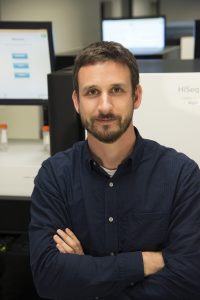Immunotherapies rely on the body’s ability to recognize cancer cells for what they are – unwelcome invaders that need to be destroyed. To do this, the immune system must be taught how to distinguish between friend and foe, but this can be tricky since cancer cells are genetically similar to healthy cells. Researchers believe that neoantigens – new proteins that form on a cancer cell as a result of certain mutations in tumor DNA – could serve as red flags that help immunotherapies find the right target.

Malachi Griffith, Ph.D., and his team at the Washington University School of Medicine in St. Louis are working on a number of different ways this technique could change the game of cancer treatment.
The big-picture idea Griffith (and many others) are working on is to identify places in the genome that have changed in the tumor and develop ways to use that information to better understand the cancer and how it might be treated.
“Our work is focused on leveraging the amazing capability of our immune system to distinguish something that is foreign, or an invader, from the things that are supposed to be there,” said Griffith. “When a neoantigen is expressed in a tumor cell, it can be detected and attacked. We want to initiate an antitumor therapy within the patient’s own body that would be completely personalized to the unique characteristics of that specific tumor.”
To do this, scientists take a piece of tumor and isolate DNA from it, then sequence that DNA and compare it to normal DNA from the patient. This lets them pinpoint where there have been mutations and look at how the immune system may be able to recognize those changes. This knowledge opens many potential doors for new therapies, such as vaccines that train the immune system to target specific proteins displayed by the tumor cells. Some of these treatments have already shown success in clinical trials.
“It is really the personalized aspect of this,” said Griffith. “The notion that you could develop streamlined and sophisticated pipelines to analyze unique characteristics of a patient’s tumor and then tailor their approach to those specific characteristics is exciting.”
Griffith loved science from an early age. Then, when he was 18, his mother was diagnosed with breast cancer and passed away quickly.
“It wasn’t much more than a year from her diagnosis to her death,” said Griffith. “That was obviously a very traumatic experience during a pivotal point in my education and career development. I started to think about going into research that might be applicable to understanding cancer better.”
After finishing school and launching a research career, Griffith received a V Scholar Grant to pursue his ideas about targeting neoantigens.
“It was fantastic. I was at this stage of coming out from under the wings of my mentors, and I was just starting my independent research program. I had received a career transition award from the NIH, but needed funding for specific research ideas, I didn’t have the preliminary data needed to get more from the NIH,” said Griffith.
That is why we are so committed to the V Scholar initiative. We fund innovative, outside the box thinkers who need a start. Then, after they prove their ideas are worthy, they are able to receive millions more in funding thanks to our initial investment.
This investment in the future of cancer research is only possible thanks to your support. With your help, V-Funded scientists like Griffith will continue to innovate and make critical discoveries. Therapies will continue to improve and save more lives. And we will continue to move closer to Victory Over Cancer®.




